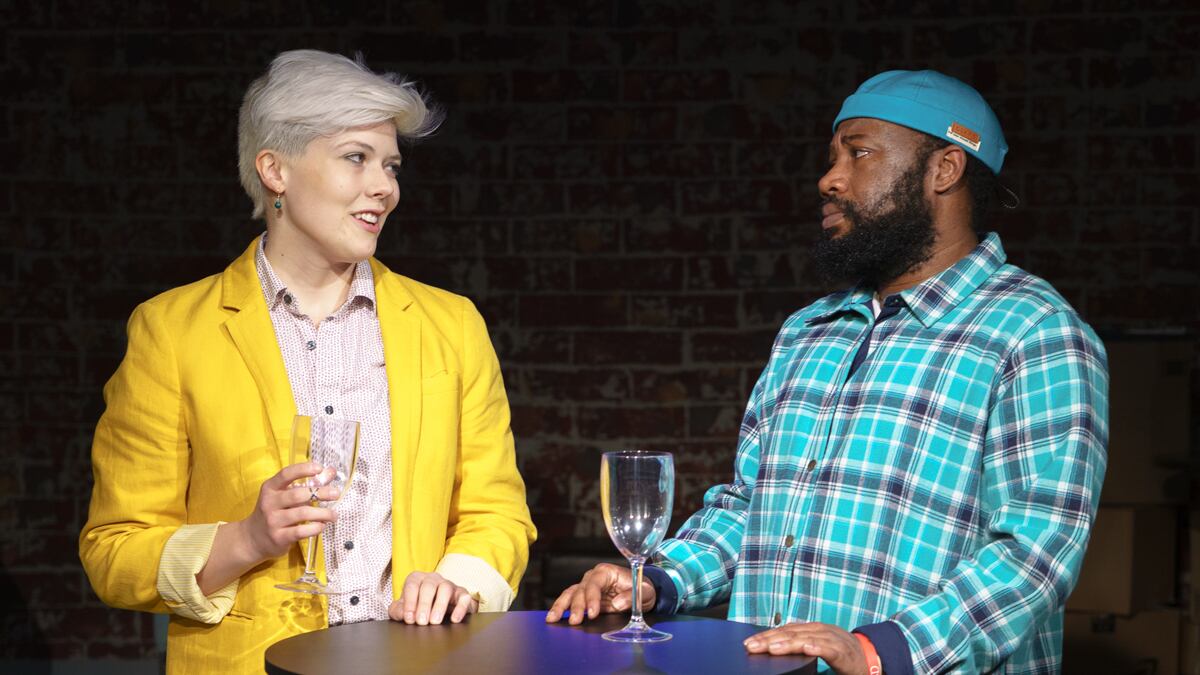In The Queers, characters reckon with the aftermath of bigotry, breakups, deceptions and suicide attempts. Yet all it takes is a single sentence to sum up what they’ve been through.
“They’re trans in a transphobic world,” says Smith (Kyran McCoy). “And that’s hard.”
Smith is right, but The Queers, a world-premiere play by Mikki Gillette being performed by Fuse Theatre Ensemble, is not simply about transgender characters. It is about transgender characters who are nuanced, contradictory, eccentric and alive.
According to Fuse, The Queers is the first play by a trans playwright produced with a trans ensemble in the Portland area. Yet the play matters not only because it is making history, but because it defends the rights of its characters to be as beautifully dysfunctional and human as any cisgender protagonist.
The Queers, directed by Asae Dean, starts with a stomach-churning scene where Lisa (Naomi Jackson), a substitute teacher, is falsely accused by her boss, Caroline (Adriana Gantzer), of inappropriately touching two students.
“I know people,” Lisa warns Caroline. “People” turns out to mean Smith, a transgender rights activist who recently secured trans health care for city employees. With some hesitance, Smith agrees to support Lisa, organizing a press conference and, later, a picket line.
The Queers seeks to capture the scope of Smith and Lisa’s social circle, which is rife with overlapping love triangles. Smith is in a relationship with Pim (Cosmo Reynolds). Pim is feuding with Smith’s ex, Ally (Juliet Mylan). Ally is furious about being abruptly dumped by Lisa. Andrea (Harper York), who is newly out as trans, has a thing for Ally and Smith.
As the one person in the group with a measure of political power, Smith fulfills the demanding dual role of advocate and confidant. “You are a giving person, and people like you can get taken advantage of,” Pim cautions.
Even when Smith lies in a hospital bed, friends seek their counsel, like planets orbiting a life-giving star. It’s a poignant scene because McCoy’s performance radiates both quiet compassion and frantic energy, suggesting that Smith is compelled to help as many people as humanly possible, even if the effort physically and emotionally rips them apart.
Gillette lets us share in Smith’s despair, but cynicism is a luxury the characters can rarely afford. “You just want everyone to accept you!” Caroline wails histrionically at Lisa, missing the fact that Lisa doesn’t just want to be accepted—she believes that acceptance is worth fighting for.
In The Queers, that fight takes place in the shadow of relatively recent history. The play begins during Barack Obama’s first term, and the passage of time is marked by everything from news about Occupy Portland to a smug sound bite from Mitt Romney (it’s not a random reference—as a teenager, Romney was reportedly the perpetrator of a violent homophobic hate crime).
The day that The Queers opened, a Texas district judge blocked the state from investigating the parents of transgender youth. While it’s sobering that the battles that Gillette depicts are far from over, the play’s very existence is evidence of change.
When I saw The Queers, you could feel the audience viscerally connecting to the play. There was fury at Caroline’s machinations, delight at Lisa’s charisma (in a memorable scene, Jackson emphasizes a line of dialogue by biting down on a piece of licorice), and tangible affection for Andrea.
Ally refers to Andrea as being “baby trans,” an experience she says is defined by “all of the hormones you never got to use during puberty switching on all at once.” For Andrea, it’s a messy but triumphant journey—and like The Queers itself, it feels like the beginning of a revolution.
SEE IT: The Queers plays at the Back Door Theater, 4319 SE Hawthorne Blvd., 214-504-6350, fusetheatreensemble.com. 7:30 pm Thursday-Saturday, 3 pm Sunday, through April 10. Pay what you will.
